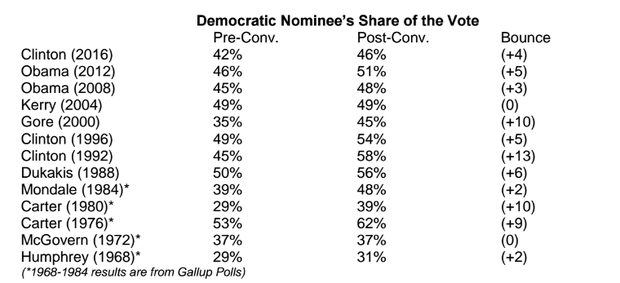Did Clinton get a post-convention bump?
By Sarah Dutton, Jennifer De Pinto, Fred Backus and Anthony Salvanto
Hillary Clinton has received a bump in support after the Democratic convention and has now pulled ahead of Donald Trump.
Forty-six percent of voters nationwide say they'll vote for Clinton in November, while 39 percent say they'll back Trump. The race was tied last week after the Republican convention. Clinton led by a similar margin in June.
Clinton got a four-point bounce after her party's convention, compared to a two-point bump for Trump after his convention.
When compared to previous Democratic presidential nominees, Clinton's bounce is similar to those President Obama got in 2012 and 2008, but short of the 13-point bounce her husband, Bill Clinton, received in 1992. In 2000, support for Al Gore rose 10 points after the Democratic convention, but he went on to lose a close race that fall.
When leaners are included - voters who are undecided when initially asked their vote preference but lean toward a candidate - Clinton leads Trump by six points.
Clinton also retains her lead when Libertarian candidate Gary Johnson is added.
Voters who back a candidate remain firm in their support. Nine in 10 Clinton and Trump voters say their minds are made up about their candidate.
In the wake of the Democratic convention, positive views of Hillary Clinton have risen five points among registered voters, from 31 percent a week ago to 36 percent today. Unfavorable views of Hillary Clinton have dropped six points: from 56 percent to 50 percent.
- Trump, Muslim family trade barbs over convention address
- Charles Koch: "I can't support either candidate"
Over half of voters continue to hold an unfavorable opinion of Donald Trump. Although Trump received a slight bounce in his favorable rating after the Republican Convention, now just 31 percent view him favorably - similar to what was recorded before his party's convention.
After the conventions, Clinton has expanded her lead with women, but she still trails Trump by a large margin among men. Clinton continues to get the support of more than eight in 10 Democrats and has seen an uptick in support among liberals. The race among independents is even; Trump led among this group last week.
Trump maintains his advantage among whites without a college degree, while Clinton has an edge among whites with a degree.
Earlier this month, two-thirds (67 percent) of those who backed Bernie Sanders during the primaries said they would vote for Clinton in November. After the Democratic convention, and a motion by Sanders himself to have Clinton selected as the nominee, her support among Sanders voters has risen to 73 percent.
This poll was conducted by telephone July 29-31, 2016 among a random sample of 1,393 adults nationwide, including 1,131 registered voters. Data collection was conducted on behalf of CBS News by SSRS of Media, PA. Phone numbers were dialed from samples of both standard land-line and cell phones.
The poll employed a random digit dial methodology. For the landline sample, a respondent was randomly selected from all adults in the household. For the cell sample, interviews were conducted with the person who answered the phone.
Interviews were conducted in English and Spanish using live interviewers.
The data have been weighted to reflect U.S. Census figures on demographic variables.
The error due to sampling for results based on the entire sample could be plus or minus three percentage points. The margin of error for the sample of registered voters is three points. The error for subgroups may be higher and is available by request. The margin of error includes the effects of standard weighting procedures which enlarge sampling error slightly.
This poll release conforms to the Standards of Disclosure of the National Council on Public Polls.

